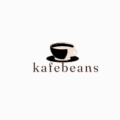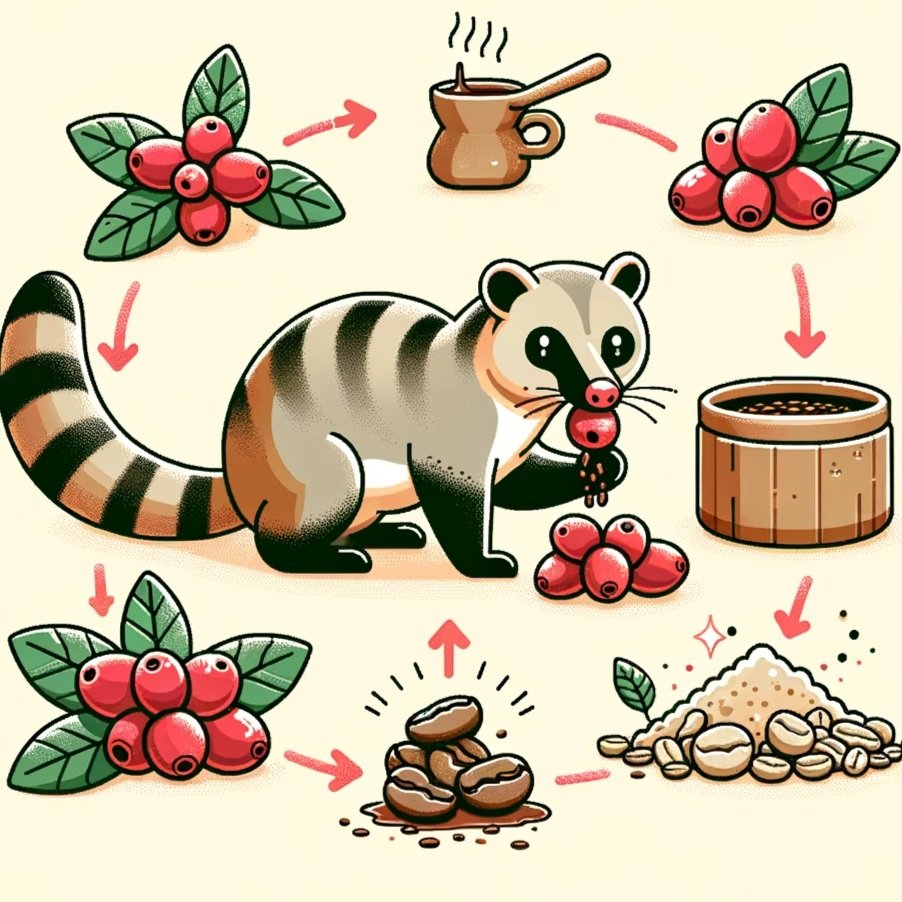Imagine sipping on a brew so exquisite, it’s not just a morning ritual but an unparalleled experience. Coffee, our daily elixir, spans a vast realm of flavors, stories, and values. Yet, standing tall amidst this diverse landscape is a coffee that doesn’t merely wake you up; it takes you on a journey.
Welcome to the world of the most luxurious coffee on the planet. Join us as we explore its mystique, the allure of its rarity, and the debates that brew around it
Origins: A Unique Journey from Forest to Cup
Yes, the title of the most expensive coffee often goes to Kopi Luwak, originating from the Indonesian archipelago.
The name “Kopi Luwak” itself is derived from the local language. “Kopi” means coffee in Indonesian, and “Luwak” is the local term for the civet. Thus, “Kopi Luwak” translates to “Civet Coffee.”
The story begins during the Dutch colonial era, who established coffee plantations in Indonesia (Sumatra, Java, and Sulawesi). Local farmers were forbidden from harvesting coffee for their use but only for exports and in their quest to enjoy the aromatic brew, the locals noticed that the Asian Palm Civet, a small, cat-like mammal native to the region, would eat ripe coffee cherries but leave the beans undigested in their droppings.

Out of curiosity and perhaps a bit of defiance, these farmers began collecting the beans from the feces of the civet, cleaning them thoroughly, and then roasting them to make coffee. To their delight, the coffee produced had a unique and enhanced flavor profile compared to regular coffee beans.
The Exclusivity and Most Expensive Coffee Tag
The distinctive fermentation process that occurs in the civet’s stomach imparts a unique flavor to the beans, making them smoother and less acidic. This natural process, combined with the meticulous manual collection of beans, contributes to its exclusivity.
As for its price, Kopi Luwak can range from $100 to $600 per pound, making it significantly pricier than most other coffee varieties. The cost is a reflection of its labor-intensive production process and its unique taste. We will talk more about its price and evolution. But before that, let’s briefly touch on its taste profile

Kopi Luwak Taste Profile
- One of the most distinguishing features of Kopi Luwak is its smooth texture. The unique fermentation process (civet’s digestive system) breaks down certain proteins responsible for bitterness in coffee. As a result, Kopi Luwak offers a notably smoother cup compared to many other coffee varieties. In addition, Kopi Luwak is characterized by its low acidity, making it gentler on the stomach with a mellow, rounded profile, that many coffee enthusiasts appreciate.
- Thanks to the natural fermentation process, Kopi Luwak often has subtle sweet undertones. These can manifest as hints of caramel, molasses, or even tropical fruits, depending on the specific batch and region of origin. Despite its smoothness, Kopi Luwak is full-bodied, offering a robust and satisfying mouthfeel that lingers.
- Given its unique production process, it’s not surprising that Kopi Luwak has a distinct earthiness. Some drinkers also describe a musty or mossy note, reminiscent of the forest floor.
Kopi Luwak Price
The price of these unique coffee beans can range from $45 per pound (farmed) to $600 per pound (wild-collected). A single cup of coffee can go up to $100 per cup.
It’s worth noting that there’s a significant difference in price between farmed and wild Kopi Luwak. The wild variety is more expensive due to the labor-intensive process of sourcing the beans from wild civets and the superior taste it offers. In contrast, farmed Kopi Luwak is produced in larger quantities, often in conditions that raise ethical concerns.
In Indonesia, low-grade farmed Kopi Luwak can be found in supermarkets for as cheap as $45 per pound. However, for the wild variety, prices can skyrocket. Some online suppliers are selling a kilo (2.2 lbs) of wild Kopi Luwak for $659. There have even been reports of Kopi Luwak being advertised online at prices ranging from $680 – $1300 per pound.
It’s essential to be cautious when purchasing Kopi Luwak due to the prevalence of counterfeit products in the market. Estimates suggest that around 80% of the wild Kopi Luwak market might be fake.
Price evolution over the last 20 years
2000s: ($300 per pound)
During the early 2000s, the demand for Kopi Luwak began to rise, especially in Western countries. Farmed Kopi Luwak was around $50-$100 per lb, and wild-collected was around $300 per lb. This was partly due to its unique production process and the allure of its exclusivity. The price for wild-collected Kopi Luwak was significantly higher than that of farmed Kopi Luwak, reflecting its superior taste and ethical sourcing.
2010s: ($1000 per pound)
The price continued to increase during this decade, especially for wild-collected Kopi Luwak. The growing awareness of the unethical practices in farmed Kopi Luwak production led to a surge in demand for the wild variety. By the mid-2010s, wild Kopi Luwak could sometimes be found selling for more than $1,000 per pound online.
By 2022, the price of farmed Kopi Luwak had slightly decreased, possibly due to increased awareness of the ethical concerns surrounding its production. However, the price of wild Kopi Luwak remained high, reflecting its continued demand among coffee connoisseurs.
You can read more about the general coffee price history here.
Controversies: The Dark Side of Luxury Coffee
Behind the allure of its exclusivity lies a series of controversies that have raised eyebrows and ethical concerns.
Animal Welfare Issues
The skyrocketing demand for Kopi Luwak has led to a surge in caged civet farms. Here, civets are confined to cramped spaces, leading to significant distress. Force-fed a diet solely of coffee cherries, these animals face malnutrition and a host of health issues. The stress of captivity often results in a shortened lifespan for the civets, raising severe animal welfare concerns.
The Question of Authenticity
With high prices come counterfeit products. The market is rife with fake Kopi Luwak, misleading consumers and diluting the genuine experience. Even within the realm of authentic Kopi Luwak, there’s a vast difference between beans from wild civets and their caged counterparts. The latter often lacks the depth of flavor, yet many sellers blur the lines between the two, leading to quality and authenticity challenges.

Environmental and Economic Impacts
The Kopi Luwak industry has inadvertently contributed to deforestation, endangering civet habitats and the broader ecosystem. On the economic front, while this luxury coffee fetches high prices globally and is indeed the most expensive coffee, the local farmers and workers see only a minuscule fraction of the profits, highlighting economic disparities.
Ethical Consumerism and Health Concerns
Misleading marketing tactics, where Kopi Luwak is labeled as “wild” or “ethically sourced” when it’s from caged civets, have raised ethical dilemmas. Additionally, given the unique production process, concerns about the hygiene and safety of Kopi Luwak have also surfaced.
Brands and Availability
Several brands globally market Kopi Luwak, with some of the most renowned being Kopi Luwak Direct, Gayo Kopi, and Luwak Star. These brands often provide certificates of authenticity, ensuring that you’re getting genuine Kopi Luwak.
As for finding it in popular coffee chains like Starbucks, the answer is no. Kopi Luwak’s exclusivity and ethical concerns (which we’ll delve into shortly) make it a rare offering, typically found in specialty coffee shops or high-end retailers.
Here’s where you can buy it:
Online Retailers:
- Amazon: Amazon offers a range of Kopi Luwak options from different sellers. Always check reviews and seller ratings.
- eBay: Similar to Amazon, eBay has various sellers offering Kopi Luwak. Ensure you’re buying from a reputable seller.
- Specialty Coffee Websites: Kopi Luwak Direct, Gayo Kopi, & Luwak Star websites sell genuine Kopi Luwak with certificates
- Direct from Plantations: Some Indonesian coffee plantations have their own websites and offer direct sales, ensuring a fresher product.
Physical Stores:
- Specialty Coffee Shops: High-end coffee shops in major cities stock Kopi Luwak. They also offer tasting sessions.
- Gourmet and Luxury Food Stores: Stores that specialize in luxury or gourmet products might carry Kopi Luwak.
- Airports: Some duty-free shops, especially in Asian airports, sell Kopi Luwak.
Things to Consider When Buying:
- Certification: Ensure that the Kopi Luwak you’re purchasing comes with a certificate of authenticity. This helps verify that it’s genuine.
- Ethical Sourcing: Given the controversies around Kopi Luwak production, it’s crucial to ensure that the coffee is ethically sourced. Look for products labeled as “wild-caught” or “cage-free.”
- Price: If the price seems too good to be true, it probably is. Extremely low prices might indicate counterfeit or low-quality products.
- Origin: Genuine Kopi Luwak primarily comes from Indonesia, particularly regions like Sumatra, Java, and Sulawesi. Ensure the product specifies its origin.
Conclusion
The world of coffee is vast and varied, with Kopi Luwak reigning as its most luxurious offering. While its unique taste and production process make it a sought-after delicacy, it’s essential to approach it with a discerning eye, ensuring that what you’re sipping is not just authentic but also ethically produced. After all, the true essence of luxury lies not just in exclusivity but also in conscious consumption.
Sources:
- Kopi Luwak: The Cat Poop Coffee – WE THE ORIGIN
- Kopi Luwak – The World’s Most Expensive Coffee Beans
- Kopi luwak – Wikipedia
- The Curious Case of Kopi Luwak: The World’s Most Expensive Coffee | by Joe Wilson | Sep, 2023 | Medium
- 11 Most Expensive Coffees In The World (Ranking)
- Kopi Luwak: ‘World’s Most Expensive Coffee’ Is a Tourist Trap

